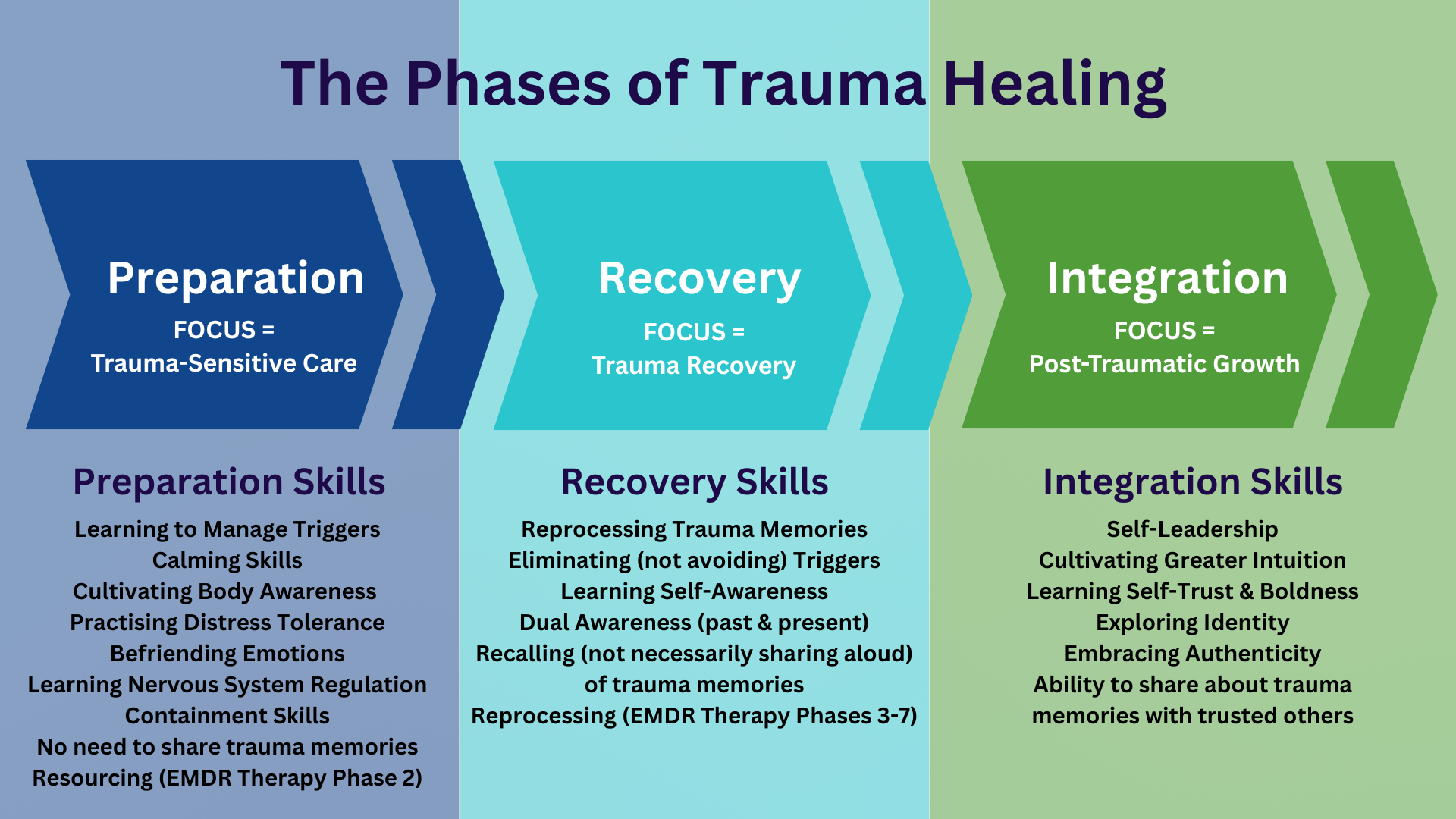Understanding Trauma Recovery
Understanding the process of trauma recovery is key to healing. At Hope Roots, our goal is to help clients progress through their healing journey to arrive at the goal of all therapy - the ability to be your authentic self with calm and joy. This means more than trauma-sensitive care, but true recovery. There are many misconceptions about trauma healing that can create barriers to care - such as the belief that healing will require sharing about trauma memories (sometimes with someone you’ve just met), when in fact this is never required. With the information below, learn more about the phases of trauma healing, the skills and goals of each phase, and how Hope Roots (or other trauma-focused therapy) can help you fully recover from trauma, rather than merely managing symptoms and triggers.
Trauma-Sensitive Care vs. Trauma Recovery: Why the Distinction Matters
Understanding the difference between trauma-informed care and trauma recovery is crucial for both survivors and the communities that support them. Trauma-informed care focuses on creating accessible environments that minimize triggers and prevent re-traumatization. It's about how systems, providers, and communities can hold space for survivors - offering safety, support, and accommodations that make healing possible. In contrast, trauma recovery is the personal healing journey a survivor embarks on. It involves actively working through trauma - usually in therapy - by reprocessing traumatic memories, reducing and eventually eliminating triggers rather than just avoiding them. Recovery is typically a phased process: first comes preparation, where survivors build emotional regulation skills and learn to access calm; then reprocessing, where they confront and work through trauma; and finally, integration, where they reconnect with their intuition, explore identity, and begin living in alignment with their authentic selves.
This distinction matters because trauma responses like anxiety, fear, and emotional dysregulation are not permanent personality traits. Too often, trauma survivors are led to believe that their symptoms are due to a “chemical imbalance” or brokenness and must simply be managed indefinitely. In reality, many don’t realize that full recovery is possible. As survivors heal, boundaries become easier to set, not out of fear, but from a grounded sense of self. Recognizing that others may trigger us but do not cause our emotional responses is incredibly empowering. It reminds us that while others are responsible for their harmful behavior, we are not powerless in the aftermath. Recovery is ultimately about reclaiming that power and becoming the most authentic, unafraid version of ourselves.
“Too often, trauma survivors are led to believe that their symptoms are due to a ‘chemical imbalance’ or brokenness and must simply be managed indefinitely. In reality, many don’t realize that full recovery is possible.”
Understanding the Phases
Trauma Therapy Preparation
The preparation phase of trauma therapy is all about building the internal skills needed to feel safe, grounded, and resilient before diving into trauma processing. This stage focuses on learning to manage triggers and practicing calming techniques that help regulate the nervous system. Clients develop greater body awareness, which is essential for recognizing early signs of distress, and they begin to cultivate distress tolerance - the ability to stay present and grounded even in uncomfortable emotional states. Befriending emotions, rather than avoiding or suppressing them, becomes a key part of this process. Containment skills are introduced to help set emotional boundaries and prevent overwhelm, while resourcing helps clients identify internal and external supports that bring a sense of safety. These skills are the focus of EMDR Therapy phase 2. Importantly, this phase does not require sharing trauma memories. Instead, it lays the foundation for deeper healing by helping clients feel more in control of their responses and more connected to their bodies. In EMDR Therapy, clients do not need to share about their trauma memories and are not encouraged to recall trauma memories until they have finished preparation.
At Hope Roots, all our therapists are skilled in helping clients prepare for deeper trauma work, but will encourage them to progress towards recovery. We created a 2-day intensive designed specifically to help with trauma therapy preparation and our Mindful Movement group is ideal for clients who need to develop greater body awareness and practice the preparation skills in a trauma-sensitive container. Neurofeedback therapy can help clients learn emotional regulation, improve sleep patterns, cultivate awareness, and reduce anxiety symptoms and mental “chatter”, making it easier to proceed to towards trauma recovery.
Trauma Recovery
Trauma recovery involves actively working through past experiences in order to heal, rather than just cope. A key part of this process is reprocessing trauma memories - often through therapies like EMDR, particularly in Phases 3 through 7. This involves recalling distressing memories (though not necessarily sharing them aloud) while maintaining dual awareness - the ability to stay rooted in the present while safely connecting to the past. Through this process, the emotional charge of the trauma is reduced, and triggers are not just avoided but gradually eliminated. As healing progresses, individuals develop deeper self-awareness, recognizing how past experiences shaped current reactions and learning how to respond rather than react. Trauma recovery isn’t about reliving the past, but about transforming how it lives in the body and mind so that survivors can move forward with greater freedom and resilience.
At Hope Roots, all our therapists are trained in EMDR Therapy, but also use other modalities - Internal Family Systems Therapy (IFS), Neurofeedback Therapy, Brainspotting, and Somatic Psychotherapy - to help clients reprocess trauma memories. Memories are reprocessed until the client reports no triggers, negative cognitions, or somatic discomfort when recalling the trauma. Our Taking Up Space group is a group for clients recovering from an abusive relationship - the group will begin with preparation, but is ideal for clients who are close to being ready to reprocess trauma memories. The group members will progress through all 8 phases of EMDR Therapy as a group, support each other as they recover, witnessing and celebrating each other’s progress.
Trauma Healing Integration
Trauma integration is the stage where true post-traumatic growth begins to unfold. With the most intense healing work behind them, survivors shift their focus to reclaiming and redefining who they are beyond the trauma. This phase emphasizes self-leadership - the ability to navigate life with clarity, confidence, and a deep sense of personal agency. Survivors begin to cultivate greater intuition and self-trust, allowing them to make bold, aligned choices without being held back by fear or self-doubt. Identity exploration becomes a central part of this journey, as individuals reconnect with parts of themselves that may have been suppressed or fragmented during trauma. Authenticity becomes a guiding value, as they embrace who they truly are rather than who they had to be to survive. With increased safety and empowerment, many also find themselves able to share their trauma stories - selectively and with trusted others—not out of obligation, but as a reflection of their healing and integration.
At Hope Roots, we believe that trauma healing integration is best done in group therapy, where clients can tap into their new found strengths in a supportive environment. While our clients are progressing through trauma recovery, we form Trauma Therapy Integration groups as often as possible for our clients to continue towards integrating their growth together. Psychedelic-Assisted Psychotherapy is also a great way for trauma survivors to transition from a focus on recovery and reprocessing to exploring their identity and post-traumatic growth.


